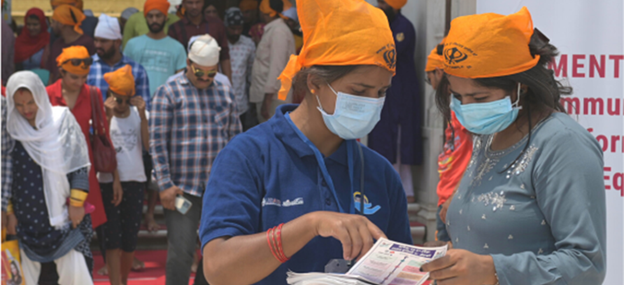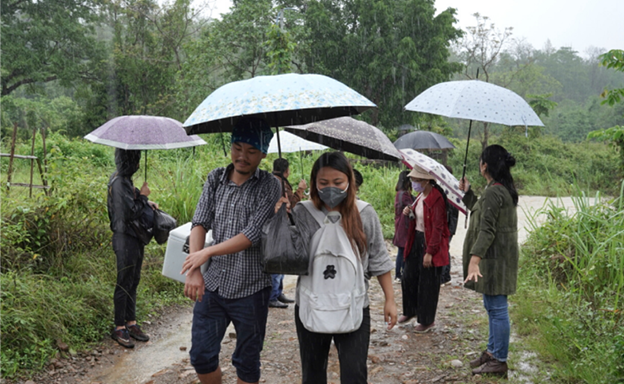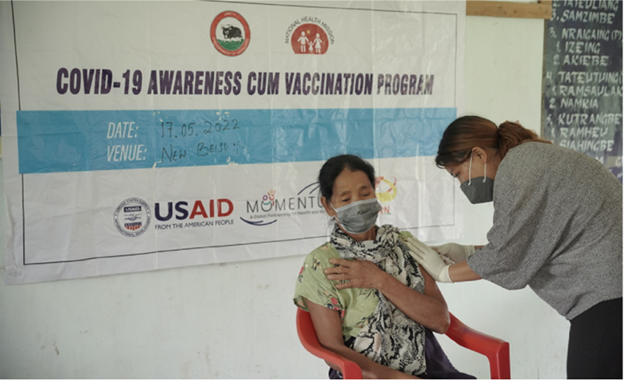How Women are Delivering COVID-19 Vaccines in India’s Most Remote and Crowded Communities
Published on April 17, 2023

by Anumegha Bhatnagar, Risk Communications Lead, MOMENTUM Routine Immunization Transformation and Equity India
Meet Kuljit, an auxiliary nurse and midwife (ANM) trained by MOMENTUM Routine Immunization Transformation and Equity to support the Government of India and local organizations to reach marginalized and vulnerable populations with the COVID-19 vaccination. The project works across 18 states in India; Kuljit is based in Punjab State. Outside the Golden Temple in Amritsar, Kuljit is ready at her vaccination booth, fighting vaccine hesitancy, dispelling myths, and expertly administering the COVID-19 vaccine to those who want it. In charge of vaccinating thousands of people who visit this important religious landmark, Kuljit sends a welcoming smile to the steady stream of devotees and tourists who pass her vaccination booth.
During World Immunization Week, we celebrate the women health workers who are delivering COVID-19 vaccines to the people of India no matter who they are or where they live. Working closely with state governments and district authorities, the project supports community teams that deliver the COVID-19 vaccine. The teams focus on mobilizing marginalized and vulnerable populations who want to receive the COVID-19 vaccine by raising awareness and making it available.
The project partners with the Indian Medical Association, the Federation of Obstetric and Gynaecological Societies of India, and faith-based organizations to address vaccine hesitancy. To help ensure everyone is protected, the COVID-19 vaccination program strengthens demand among priority groups and emphasizes inclusion of people with a substance use disorder, transgender people, female sex workers, and people living with HIV.
With empathy, attention, and patience, ANM workers are instrumental in raising vaccine confidence among marginalized and vulnerable populations. Kuljit and her peers strive to reach as many people as possible within these groups to help the people reduce their risk of getting sick or dying from COVID-19. Kuljit and her team share information in local languages at community meetings and through WhatsApp to dispel myths and make it easier for people to understand why vaccination is so important. They also nurture champions from vulnerable populations to encourage vaccine uptake and inspire trust by sharing their experiences and knowledge.

Far from the crowds at the Golden Temple in Punjab, where the roads become inaccessible to cars, health worker Kimhoichong and her team of vaccinators continue on foot to bring COVID-19 vaccinations to the hard-to-reach areas in Nagaland State on India’s remote eastern border.
They press ahead toward Athibung block in Peren district, across rivers and streams, to reach at-risk groups, including pregnant and lactating mothers, migrants, persons with disabilities, the elderly, and others located in hard-to-reach tribal areas.
To reach large groups of people with information and COVID-19 vaccines, the team uses creative methods, including campaigns that mobilize schools and churches. Door-to-door visits by social mobilizers, counseling sessions to clear doubts and debunk myths, and frequent use of public service announcements have raised awareness, increased vaccine confidence among the state’s underserved communities, and encouraged visits to vaccination booths.

Kuljit and Kimhoichong, and many other COVID-19 vaccinators like them, are part of a local network of NGOs that bring equitable vaccination to vulnerable, hard-to-reach, and marginalized communities with support from MOMENTUM. So far, the vaccine teams have administered over 1.5 million doses of COVID-19 vaccines in Punjab and Nagaland states. In all 18 project-supported states, more than 15.5 million doses of approved COVID-19 vaccine have been delivered.
“My team and I are committed to reaching each and every one for COVID-19 vaccination. We all have suffered due to COVID-19, and the vaccination comes as a weapon to fight off the pandemic,” explained Kimhoichong.

